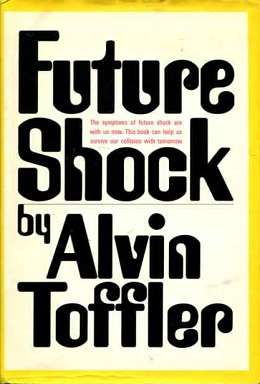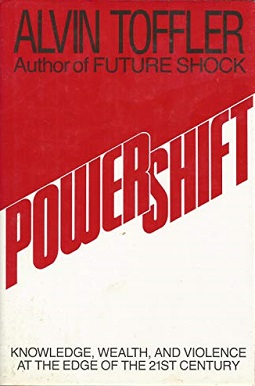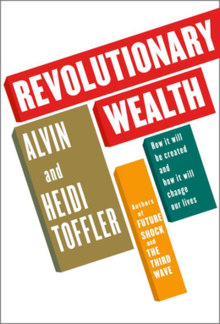
Alvin Eugene Toffler was an American writer, futurist, and businessman known for his works discussing modern technologies, including the digital revolution and the communication revolution, with emphasis on their effects on cultures worldwide. He is regarded as one of the world's outstanding futurists.

In trade, barter is a system of exchange in which participants in a transaction directly exchange goods or services for other goods or services without using a medium of exchange, such as money. Economists distinguish barter from gift economies in many ways; barter, for example, features immediate reciprocal exchange, not one delayed in time. Barter usually takes place on a bilateral basis, but may be multilateral. In most developed countries, barter usually exists parallel to monetary systems only to a very limited extent. Market actors use barter as a replacement for money as the method of exchange in times of monetary crisis, such as when currency becomes unstable or simply unavailable for conducting commerce.
Human capital is a concept used by social scientists to designate personal attributes considered useful in the production process. It encompasses employee knowledge, skills, know-how, good health, and education. Human capital has a substantial impact on individual earnings. Research indicates that human capital investments have high economic returns throughout childhood and young adulthood.
An information society is a society where the usage, creation, distribution, manipulation and integration of information is a significant activity. Its main drivers are information and communication technologies, which have resulted in rapid growth of a variety of forms of information. Proponents of this theory posit that these technologies are impacting most important forms of social organization, including education, economy, health, government, warfare, and levels of democracy. The people who are able to partake in this form of society are sometimes called either computer users or even digital citizens, defined by K. Mossberger as “Those who use the Internet regularly and effectively”. This is one of many dozen internet terms that have been identified to suggest that humans are entering a new and different phase of society.

Future Shock is a 1970 book by American futurist Alvin Toffler, written together with his spouse Adelaide Farrell, in which the authors define the term "future shock" as a certain psychological state of individuals and entire societies. The shortest definition for the term in the book is a personal perception of "too much change in too short a period of time". The book, which became an international bestseller, has sold over 6 million copies and has been widely translated.
The Experience Economy is the sale of memorable experiences to customers. The term was first used in a 1998 article by B. Joseph Pine II and James H. Gilmore describing the next economy following the agrarian economy, the industrial economy, and the most recent service economy. The concept had been previously researched by many authors.
Cybotron was an American electro music group formed in 1980 by Juan Atkins and Richard "3070" Davis in Detroit. Guitarist John "Jon 5" Housely joined soon afterward. Cybotron had a number of singles now considered classics of the electro genre, particularly "Clear" and the group's debut, "Alleys of Your Mind," as well as "Cosmic Cars" and "R-9".
A prosumer is an individual who both consumes and produces. The term is a portmanteau of the words producer and consumer. Research has identified six types of prosumers: DIY prosumers, self-service prosumers, customizing prosumers, collaborative prosumers, monetised prosumers, and economic prosumers.

The Three Sacred Treasures are the imperial regalia of Japan and consist of the sword Kusanagi no Tsurugi (草薙劍), the mirror Yata no Kagami (八咫鏡), and the jewel Yasakani no Magatama (八尺瓊勾玉). They represent the three primary virtues: valour, wisdom, and benevolence. The actual historical status of these legendary treasures is unknown as they are intentionally kept from public view to symbolize authority.
Knowledge workers are workers whose main capital is knowledge. Examples include programmers, physicians, pharmacists, architects, engineers, scientists, design thinkers, public accountants, lawyers, editors, and academics, whose job is to "think for a living".
Futurists are people whose specialty or interest is futurology or the attempt to systematically explore predictions and possibilities about the future and how they can emerge from the present, whether that of human society in particular or of life on Earth in general.

Futures studies, futures research, futurism or futurology is the systematic, interdisciplinary and holistic study of social and technological advancement, and other environmental trends; often for the purpose of exploring how people will live and work in the future. Predictive techniques, such as forecasting, can be applied, but contemporary futures studies scholars emphasize the importance of systematically exploring alternatives. In general, it can be considered as a branch of the social sciences and an extension to the field of history. Futures studies seeks to understand what is likely to continue and what could plausibly change. Part of the discipline thus seeks a systematic and pattern-based understanding of past and present, and to explore the possibility of future events and trends.
In archival science, a fonds is a group of documents that share the same origin and that have occurred naturally as an outgrowth of the daily workings of an agency, individual, or organization. An example of a fonds could be the writings of a poet that were never published or the records of an institution during a specific period.
In futures studies and the history of technology, accelerating change is the observed exponential nature of the rate of technological change in recent history, which may suggest faster and more profound change in the future and may or may not be accompanied by equally profound social and cultural change.
The difference between material culture and non-material culture is known as culturallag. The term cultural lag refers to the notion that culture takes time to catch up with technological innovations, and the resulting social problems that are caused by this lag. In other words, cultural lag occurs whenever there is an unequal rate of change between different parts of culture causing a gap between material and non-material culture. Subsequently, cultural lag does not only apply to this idea only, but also relates to theory and explanation. It helps by identifying and explaining social problems to predict future problems in society. The term was first coined in William F. Ogburn's 1922 work 'culture do not synchronize exactly with the change in the material culture, this delay is the culture lag. If people fail to adjust to the rapid environmental and technological changes it will cause a lag or a gap between the cultures. This resonates with ideas of technological determinism, which means that technology determines the development of its cultural values and social structure. That is, it can presuppose that technology has independent effects on society at large. However it does not necessarily assign causality to technology. Rather cultural lag focuses examination on the period of adjustment to new technologies. According to sociologists William F. Ogburn, cultural lag is a common societal phenomenon due to the tendency of material culture to evolve and change rapidly and voluminously while non-material culture tends to resist change and remain fixed for a far longer period of time. This is due to the fact that ideals and values are much harder to change than physical things are. Due to the opposing nature of these two aspects of culture, adaptation of new technology becomes rather difficult. This can cause a disconnect between people and their society or culture. This distinction between material and non-material culture is also a contribution of Ogburn's 1922 work on social change. Ogburn's classic example of cultural lag was the period of adaptation when automobiles became faster and more efficient. It took some time for society to start building infrastructure that would tailor mainly to the new, more efficient, vehicles. This is because people are not comfortable with change and it takes them a little time to adapt. Hence, the term cultural lag.

The Third Wave is a 1980 book by Alvin Toffler. It is the sequel to Future Shock (1970), and the second in what was originally likely meant to be a trilogy that was continued with Powershift: Knowledge, Wealth and Violence at the Edge of the 21st Century in 1990. A new addition, Revolutionary Wealth, was published, however, in 2006 and may be considered as a major expansion of The Third Wave.
Infosphere, analogous to a biosphere, is a metaphysical realm of information, data, knowledge, and communication, populated by informational entities called inforgs.
The idea that knowledge has value is ancient. In the 1st century AD, Juvenal (55-130) stated “All wish to know but none wish to pay the price". In 1775, Samuel Johnson wrote: “All knowledge is of itself of some value.”
Ephemeralization, a term coined by R. Buckminster Fuller in 1938, is the ability of technological advancement to do "more and more with less and less until eventually you can do everything with nothing," that is, an accelerating increase in the efficiency of achieving the same or more output while requiring less input. The application of materials and technology in modern cell phones, compared to older computers and phones, exemplify the concepts of Ephemeralization whereby technological advancement can drive efficiency in the form of fewer materials being used to provide greater utility. Fuller's vision was that ephemeralization, through technological progress, could result in ever-increasing standards of living for an ever-growing population. The concept has been embraced by those who argue against Malthusian philosophy.

Powershift: Knowledge, Wealth and Violence at the Edge of the 21st Century is the third book in a trilogy written by the futurist Alvin Toffler, following Future Shock (1970) and The Third Wave (1980). The hardcover first edition was published October 1, 1990.







